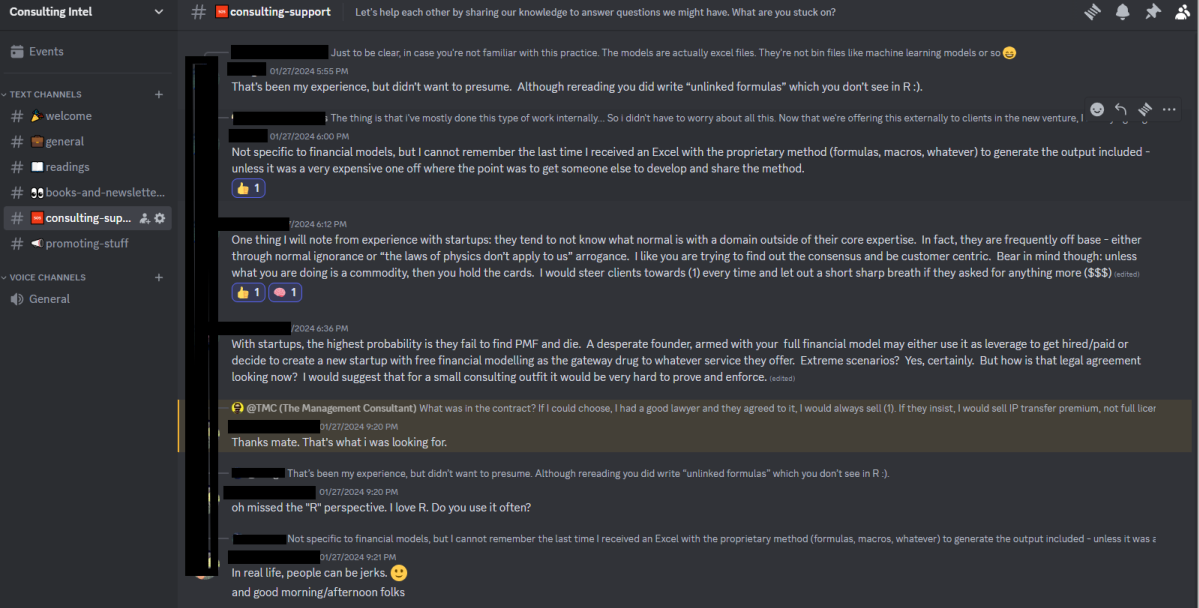New-age consulting: how consultancies have shifted over the last two decades
Reflecting upon the features that modern consulting firms must implement to be future-ready
Hello to the 1,351 subscribers who read Consulting Intel!
I have been part of the consulting world all of my professional career.
In the past two decades, I have witnessed an evolution of the industry because client demands shift constantly, and so does the expectation of what a consultant is or does.
The rise of technology as the foundational infrastructure driving the gears of every business - no matter scale or size - has been an exciting ride to watch.
Looking back, is hard to wrap my mind around it.
When young people just starting their career, or even mid-career journeymen, ask me if they should take the leap toward consulting, I rarely advise them not to.
Yes, I understand that the decision is personal, and no career path is set in stone.
Still, the opportunity to work in such a fast-moving sector presents a low downside and significant upside, especially if you are fresh out of college, have fewer responsibilities and an unclear idea of what to make of yourself.
In the 2000s, multinational corporations and governments of all levels were happy to pay a bunch of smart guys with an MBA and exceptional PowerPoint skills to conduct a few interviews, summarize the learnings into pretty slides, and then disappear.
This model in its essence is still prevalent, however its dominance over what I call new-age consulting is decreasing every year, as challenges of 21st century society evolve and client demographics diversify.
New-age consulting: what and why
New-age consulting is based on the principle that smart people with fancy degrees should not just tell you what to do but also go beyond and do it for you.
Consulting in the 2020s needs to combine strategy with execution more than ever. This is nothing too new, but I still see a huge scope for expansion.
The sign of the times is that even the MBBs (McKinsey, Bain and BCG: the big 3 strategy firms) throughout the last decade have been desperately trying to buy implementation capabilities, transitioning toward a more end-to-end offering.
A recent example is McKinsey’s acquisition of Iguazio, an Israeli AI startup. The purchase allows McKinsey to bolster its tech implementation services offer.
Bain & Company also acquired PiperLab, a prominent provider of artificial intelligence (AI) and machine learning (ML) solutions. The bid enabled to Bain to scale its AI and ML offerings to clients all over Europe, Middle East & Africa.
In September 2022, BCG bought Quantis, a leading environmental sustainability consultancy to expand its services toward sustainability transformation.
I could go on for days but you got the gist of it…
I suspect when many people look down at consultants, they have in mind that old archetype of the “expert” in a fine suit, wearing a fancy watch who, without any experience in running a business, comes and tells you how to run yours.
News of consulting firms guilty of assisting authoritarian regimes, evil pharma companies, and fossil fuel corporations surely does not help their reputation either.
Many years ago, I almost choked when I read this news of a senior UK government official summarizing McKinsey’s work: “They come and state the bleeding obvious using Powerpoint.”
Consultants with skin-in-the-game are necessary for organizations to excel
Business and technology go hand-in-hand now more than ever: people can not run a successful business if they don’t have a well-thought-out technology strategy that is executed to perfection.
As the use of technologies to drive profits and grow influence heightens, the reasons why corporations or governments hire consultants also change.
It’s less and less a “tell me how to do it” and more and more an “actually do it.”
In the modern climate, organizations need a “consulting partner” not just a “consultant”.
There are many reasons why client organizations cannot incubate all capabilities they need under the roof of one firm.
Any organization primarily has a core business, the why behind its operations in a specific industry. Their main focus is to build skills in their core area, which might not necessarily include staying updated with the latest technological advancements.
Also, when you have been in the business for too long (or too little), you might need different tools to scale or start growing at different times.
A partner consulting firm helps you identify high-leverage actions for growth while taking ownership to implement said strategies, thus showing skin in the game.
Consulting partners, going down and dirty with you and for you, is where the industry is going.
Mocking con-sultants (as I just did) is fine, and I love it too.
In fact, I encourage it.
It’s fun.
But consultants, and the entities that employ them, get a wide experience working across numerous cross-industry problems at various enterprises in many geographies, enabling knowledge curation that most client organizations cannot access internally - an insights pursuit approach that is expensive and time-consuming to build from scratch.
You may as well buy it.
By the way, traditional consulting firms are also exposed to challenges similar to those their clients fight.
If you focused purely on strategy for 30 years, good luck changing that model quickly.
The Wall Street Journal dedicated a recent article to this conundrum (click here to avoid the paywall).
The same goes the other way around.
If your services firm is a tech shop, adding a consulting arm to the organizational structure may prove harder than expected, predominantly due to substantial differences in the commercial models.
However, interesting types of consulting firms trying to bridge this gap are emerging that are native to the new world.
I have two questions for you:
How would you redesign a consulting firm that works in the world of today and, most importantly, will work in the world of tomorrow?
What are the features of an internet-native, remote-first consultancy?
Let me know what you think in the comments.
✍ The Management Consultant
PS: If you like this newsletter, I have one huge favor to ask.
Please spread the word. Share it with your friends and your colleagues. Ask them to subscribe.
This is the most effective way to support me (…and to keep me motivated to continue writing 😁).
Thank you!
❓ F.A.Q.
Every week, I will choose a question I received from readers and answer it in this section. All anonymous (I won’t mention you unless you ask me to)! Drop your questions here!
Got this question as part of a conversation I was having with one of the readers of this newsletter. Why am I writing all this stuff now?!
Well, this made me think...
Throughout my career, I've had some amazing mentors who really helped me, even more than they might realize. They saw potential in me that I didn't see myself, they pushed me to go for promotions and partnership early on when I didn't think it was possible. I worked hard and had some luck, but I owe a lot to these mentors for teaching me, boosting my confidence, and supporting me when things were tough.
Right now, I feel great about my career. I know my strengths and weaknesses well and I'm proud of what I've achieved.
However, I feel that a big part of this job is about leading and helping new talent grow, and it's definitely not easy to guide someone fresh out of college to help them become leaders. It takes a lot of work.
All I write is about the extra tips I wish I knew when I was starting out, the stuff my mentors didn't directly teach me. I say this a lot, but I really, really, really believe that focusing only on core skills isn't enough for real growth.
This newsletter is clearly not for everyone.
It's for those who want to push themselves, take (small) risks, and explore what they're capable of. I'm writing it because I think I have something valuable to share, especially with the new generation entering the workforce.
They're not lazier or less smart than older generations: they just live in a different world with social media and digital technology.
I have high hopes for future generations. I believe they'll bring fresh ideas, passion, and a focus on what's important.
I hope I can somehow help you speed up your learning and make your journey a bit easier.🎯 INTERESTING SH*T
A few things I found on the internet that you may like…
I’m an avid reader of Louie Bacaj and his newsletter The M&Ms Newsletter. His latest issue is quite timely, and fits with what we have discussed today on Consulting Intel.
What David Perell is creating on his YouTube channel is impressive. This conversation with Shaan Puri was lit, and I enjoyed it:
I posted this on 𝕏 and it was a good reflection. In the last 20 years, my dress code changed quite dramatically. Sure, different countries have different customs, but it’s wild to see how much things shifted in just a couple of decades (and I’m still young!!)
🚨 SPONSORSHIP
Consulting Intel is read by more than 1,300 consultants globally.
The readers include management consultants from McKinsey, BCG, Bain, Deloitte, EY, EY-Parthenon, KPMG, PwC, Accenture, Oliver Wyman, PA Consulting, and various boutique consultancies worldwide.
Many corporate employees and independent consultants are regular readers of Consulting Intel.
If you think your products or services could resonate with this audience, get in touch!
👀 JOIN THE DISCORD SERVER
If you like this newsletter, you will love our Discord Server.
In there, you will find a tight-knit community of more than 70 management consultants from all over the world discussing real-life challenges, giving each other support and recommending the good stuff to keep our knowledge top notch.











As I’m reading, I’m thinking ‘oh yes - you’re right!’ This is exactly what we expect if consultants now! It’s not just about articulating the problem and identifying recommendations, it’s also about implementing the fix! I’ve worked with two different consultants in the last year and both of them have produced presentation slides, reports etc. it feels less like an inspectoral relationship and more like a fixed term employee contract…..
A good read.
IMHO, one angle of disruption (happening already) is thru networks and consortia of independents or small bit players, buddying up around common client problems etc.
These individuals and micro-consultancies can be at a time in their career or family that suits working independently.
The other thing to keep asking: is what do people need. As Gen-X approaches retirement, could there be generational shifts in what consulting buyers might look like and need?
Much to ponder.